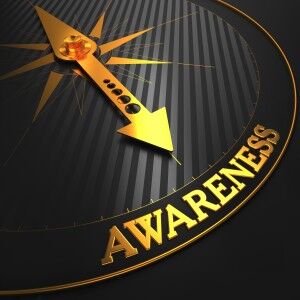5 Steps to Greater Self-Awareness in Business
By Maren Perry, MA PCC
Recently I was facilitating an offsite. About thirty of the region’s best and brightest were gathered to develop innovative strategies for the coming year. Some of the topics on the table were about organizational culture and how the group could create a more open dialog amongst the staff. It was pointed out that not everyone felt the environment was very open to new ideas. So we asked a question:
“How many of you believe you’re open and receptive to new ideas?”
Nearly every hand went up.
“How many of you believe there are several people in this room who are NOT open and receptive to new ideas?”
All the hands went up.
Clearly there was a disagreement about how open the culture was: people generally believed that THEY were open and receptive, but others had a different opinion of them.
 This is the fundamental gap in self-awareness that can be fatal to leaders.
This is the fundamental gap in self-awareness that can be fatal to leaders.
We all have a view of ourselves from our own perspective. We live the Go-Pro version of our own lives. We are constantly making decisions that we think are best – I don’t know anyone who consciously walks around and makes the decisions they think are terrible. But others may have a different opinion of our actions. So who’s “right” about the quality of those decisions – we who make them, or others who observe them?
Well, a philosophy professor could create a great assignment out of this, but as far as business applications go, I want to suggest to you the following:
Neither of them are inherently better – your perception or that of others. You may want to read that again: NEITHER OF THEM (including the one you chose that seems obviously superior) are INHERENTLY better. Of COURSE you think the one you chose is better or you wouldn’t have chosen it, but it’s not in the factual world INHERENTLY better or worse than how someone else sees the situation.
The old adage “perception is reality” is the key in the world of business. If you think you are, like those at the offsite, open and receptive and have an open door policy and are eager to hear from the Millenials in your office about possible improvements, but those employees would rather crawl under a rock than knock on your door… ARE you in fact open and receptive? I suggest that just because you FEEL you are open and receptive, if that is not how people are responding, you may want to consider that your feelings are not in fact accurate. We might say that in this area, you lack self-awareness.
What are some other examples?
- I think of myself as reliable and trustworthy but since I’m late to nearly every meeting, others don’t relate to me that way.
- I think of myself as hard-working since I typically give up Saturdays to work on projects, but I don’t always get my work to others on time, so they don’t see me as hard-working.
- I respect people in my office but the tone I use when under pressure doesn’t give them that impression.
You can see that in these examples, the gap between what I believe about myself and the “reality” of how others see it could be hugely detrimental to my relationships and how effective I can be with others as a leader. It is essential I know how I come across so that I can work with THAT, rather than what I feel from my own Go-Pro view. I need the film version with the wide-angle lens!
So how do I gain that crucial perspective?
Well, I say you can learn if you’re willing to cultivate it. Practice these:
- Be curious. Just assume you are one of the people who are NOT self-aware…. If that could, maybe, possibly be true of you, what would you start to notice and look for?
- Ask for feedback frequently and informally. Be truly curious to learn from others what they see about you. See this article for more specifics on how to do that: (accepting feedback gracefully).
- Study other people and notice what they miss. From your outside perspective, what do you see Sean missed in the meeting when he stepped over Alice’s comment and she rolled her eyes to her neighbor? What did that oversight cost him in terms of effectiveness? If you can start to notice the places others are aware and not, it can offer you some insight of places to look in your own experience.
- Put yourself in others’ shoes. We’ve all heard this advice, but it’s amazing how little we practice it fully. Before a meeting with Jerry, ask yourself: Where is he coming from before this meeting? (might he be stressed from his meeting with the boss prior? tired from staying late last night?) What are the top priorities in his head this morning? (quarterly sales figures? his son’s math homework? the fact that he didn’t get to the gym… again?) How does HE see the project we are to discuss based on his experience? (totally new to him, last year’s went poorly, his promotion rides on it?) This will help you get outside your own perspective and practice seeing your meeting from another angle.
Bonus challenge: What does he NEED given those considerations, to move forward in the direction you’re intending? (acknowledgment of his hard work, a friendly ear to vent to, to get right down to numbers, your offer of help in finding resources?)
The more thoroughly you can put yourself in his shoes, the more you can be effective standing in yours.
- Lastly, get a sense of humor about yourself. The more we relate to ourselves with lightness, the easier it is to see and admit where we messed up – or did wonderfully – and see that either way, it doesn’t matter that much because we’re still accepting of our own perfect souls.
Self-awareness is key to leadership. The words sound like they are about oneself, but actually self-awareness is the key to effectiveness with others. If you don’t know how you come across to THEM, you cannot be effective with them.
What will you do to up your self-awareness game this year?
Of course, working with a coach is another way to gain perspective about oneself. Not just because we can perform incredibly informative 360 assessments, but because we are there to reflect those very things you cannot see about yourself. If you’d like a partner on the essential leadership skill of self-awareness, schedule your complimentary consult today.
